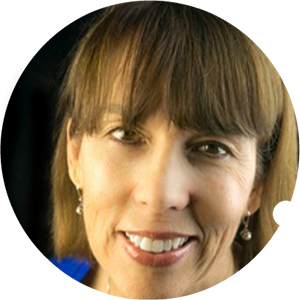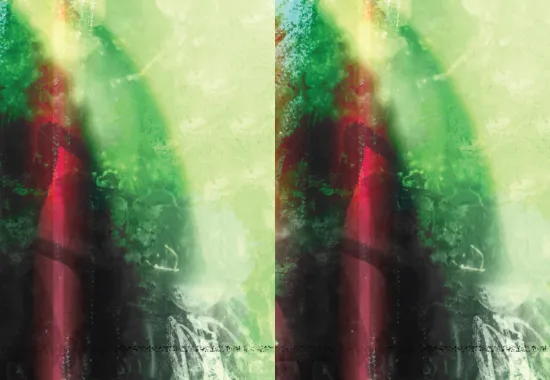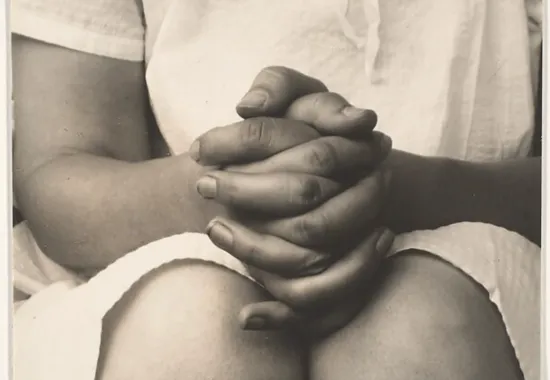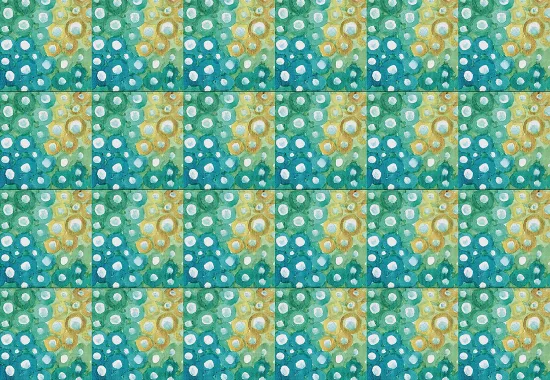A Review of Anne Myles’s Late Epistle
Anne Myles’s debut poetry collection, Late Epistle (Headmistress Press, 2023), winner of the 2022 Sappho Poetry Prize, is first and foremost a book about transformation. Through superbly crafted, vulnerable, and unflinching poems the poet writes of a lengthy and fraught path toward self-discovery tracing the beginning of that quest back to girlhood in “Bane,” the poem that prefaces the collection:
Even as a girl I felt the subtle ache
of something unknown growing,
pushing against my heart and breath.
I walked slowly, carefully,
so I wouldn’t jostle it.
Was that my charge upon the earth?
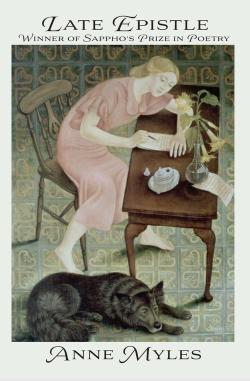 And so the speaker lays down her life’s quandary—to find her voice, to become fully herself. To name the unspeakable and remove the muck of the lake bottom “mounting the fathoms toward the world of air” (“The Flash”). Lakes are a seminal image throughout the book, appearing in seventeen out of forty-four poems as a metaphor for the speaker’s journey. “Or maybe // there was nothing, and I only sensed the depth / in the middle of the lake—that canyon // where no one could descend, its cold / currents flowing out from secret springs, / and fronds that might reach up and wrap / a feathery grip around one’s ankle” (“Fishing in Childhood”).
And so the speaker lays down her life’s quandary—to find her voice, to become fully herself. To name the unspeakable and remove the muck of the lake bottom “mounting the fathoms toward the world of air” (“The Flash”). Lakes are a seminal image throughout the book, appearing in seventeen out of forty-four poems as a metaphor for the speaker’s journey. “Or maybe // there was nothing, and I only sensed the depth / in the middle of the lake—that canyon // where no one could descend, its cold / currents flowing out from secret springs, / and fronds that might reach up and wrap / a feathery grip around one’s ankle” (“Fishing in Childhood”).
Comprised of three parts, the poem “House of My Youth,” which catalogs how the speaker’s childhood home shaped her wants, begins part one: “Because the living room was a glassed-in porch I wanted vision. // Because the trim was red I believed that longing was the same / as passion.” But the speaker’s voice is drowned out by the voices of her parents, who did not inquire about her feelings and refused to speak of things they did not wish to acknowledge: “I learned the credo: / if you don’t mention something, it’s not there” (“The Credo). The speaker in this poem alludes to “the rise and wrench of something / I could feel already, impossible to name.” Was it desire, a wanting, the realization that she was attracted to women? Though she cannot speak of it, the poem ends with her wishing she could ask her mother if “you can promise me that someday, / someday, I too will be loved?”
One of the key poems in the first section, “An Origin Story,” asks, “What dignity is there in life, I thought, without facing the / truth?” And goes on to say “I / felt it claim me then, that truth I couldn’t part from; whoever I’d / turn into would have to say it, say it, say it.” This section ends with the death of both parents and the speaker asking, “what does it mean to think of them across? / And my whole life unmoored, in transfer” (“Ferryville”). Later, we learn that this event offers the speaker some freedom as she embarks on her journey of self-discovery.
While the first part of the collection focuses on the loneliness and voicelessness of the speaker’s early years, the second part addresses desire: “Decades ago, mulberries dropped / on my back porch. / Useless, over-sweet, / they made me think of love I longed for” (“What Is”). In the poem “Distance Prayer,” the speaker acknowledges her love for women:
Because I once believed I loved men. Because I learned I loved
women. Because what had happened in between lived in me ever
after, yet, I was too ashamed to speak of it.
She says to the reader: “No, listen: beneath / all my words it is the secret story, the only thing I’m sure of” and admits that she wishes to lay her head in the lap of a lover confessing, “I’m still not sure what I want more than this.” This sentiment is repeated in the poem “Luxe, Calme et Volupté” where she writes regarding a male lover: “There’s a no in me my body’s spoken louder than my mind.” This poem goes on to state, “Something is unfolding / it would take years to understand.” That desire to understand her sexuality is repeated in “Painting the Flower”:
I see now I was painting
myself, but not my gender—or something
part of it yet stranger, mine.
. . . . . . . . . . . . . . . . . .
wondering what kind of woman I was
and what my flourishing was meant to be.
Doors, passageways and openings make repeat appearances suggesting a portal to self-discovery: “Still, a door is a passageway” (“Red Door”). “Let’s say I slept with / Virginia Woolf under my pillow, / dreaming of a gray house / with a bright red door” (“The Crack”) and “I grasped my new studies, saw a closed door opening” (“Women’s Studies”).
This section ends with the poem ”Fever” and the speaker recalling a long ago lover and asking: “How many years I’d shaken with pure longing / just to be beheld.” And in closing longs to be beloved and hopes for “some tenderness without a name to rise / and hold me precious in this house of flesh.”
The third and final section of Late Epistle considers the speaker’s later years in poems that continue to examine her difficult and vulnerable journey toward self-discovery: “asking why my whole life I kept giving up / whatever I delighted in on earth” (“In a Field”). She is at last, it seems, coming to the place she has been seeking since childhood: “I felt that I was changing, knew exactly / what I longed for, and for a minute it was me.” She feels an urgency because she is aging: “And I felt the strangeness, that here I was— / a woman alone and growing older, … / her best gifts yet unrealized” (“Inheritance”). And in the poem, “An Old Photo of Bialystok,” states what she’s been searching for: “the sight of a woman walking, hearing her footsteps / in a register different from whatever else she hears, / hearing her own silent thoughts above that.” While her thoughts remain silent she is at least able to hear them, but also realizes she needs to claim a man’s song, “the swagger of being sure.” And in a moment of epiphany recounted in “The Flash” returns to the lake/water metaphor: “one day it flashed up / shining, intent, muscular, like a fish breaking the surface / to leave rings widening on the dusk-glazed water” and realizes that all she wants is
to say it all as I wanted, tell
this life as it had been to me, even if no one would care.
In the title poem “Late Epistle,” a letter to her first therapist, the speaker recounts her choice “to obey the Lord, carry the weight / of sacrifice, no old burden I’d inherited; or select // myself, that jostling drawer of hungers.” The therapist is referred to as “the long tap root // to what I couldn’t say,” but in the end she is “a jeweled casket I held / for years until it smashed and I could choose myself again.” This reference to choosing the self is a hard fought battle the speaker has waged most of her life, which finally in her later years, she is closer to realizing. Yet, in “I Am Waiting” she admits that she has not found the love she desires, but at least she can now name it.
I am waiting for a nearly imperceptible touch
or to remember what touch is. For when I will turn
the page, and finally learn how to conjugate
the language of desire.
. . . . . . . . . . . . . . .
Who is there to tell about it?
I am telling you.
She is speaking and in speaking makes real her desires, her story, herself. Late Epistle is a finely wrought debut collection of skillfully composed poems that bravely confront the messiness of family, of loss, of desire, of how and who we love, of identity and self-discovery. ⬤
Recommended
A Review of When We Were Gun: A Narrative Poetry Cycle by Deborah Schupack
A Review of Apostasies by Holli Carrell



